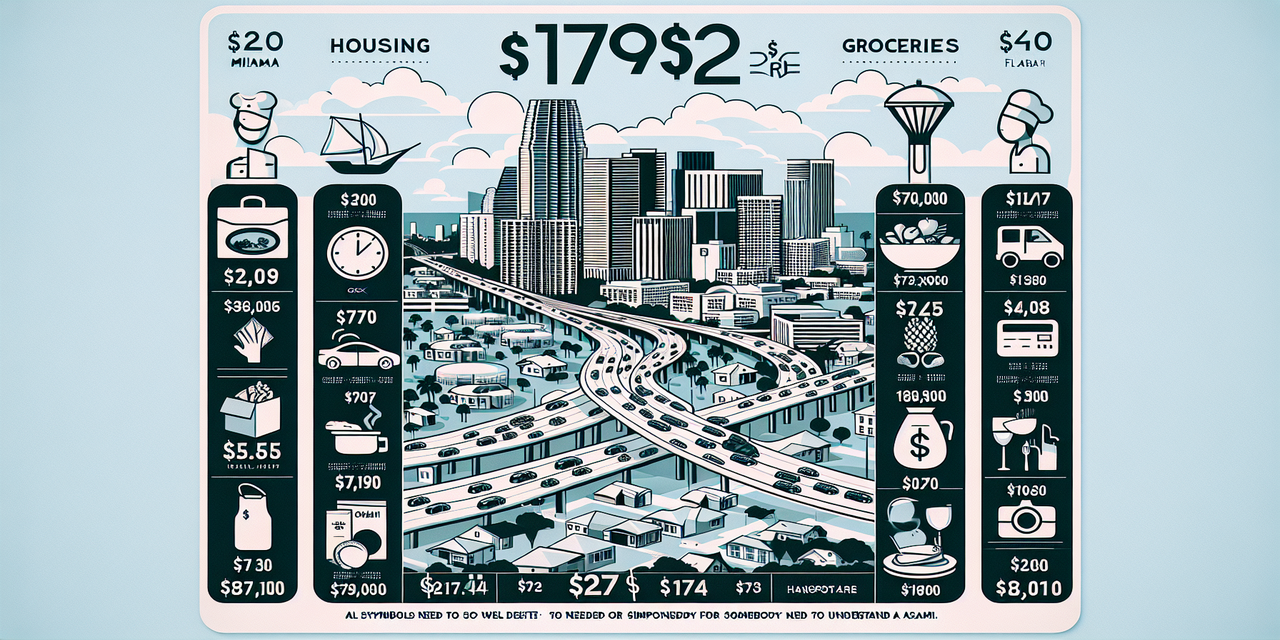Miami Cook Salary Guide and Cost-of-Living Comparison: Key Takeaways
- Average cook hourly wage in Miami is $18.01, about 12% higher than the national average.
- Median home price in Miami is $524,600, 55.2% above the national median.
- Overall Miami cost of living is 18.9% higher than the U.S. average, with rent 36.4% higher.
Understanding the cook salary landscape in Miami alongside the local cost of living is key for career planning and lifestyle decisions. This guide breaks down essential pay data and expense comparisons.
It highlights how wages align with housing and other costs, crucial for cooks and culinary professionals considering Miami.
1. Miami Cook Salary Overview
The typical cook in Miami earns approximately $18.01 per hour. This wage is significantly above the national average for cooks, which tends to be lower, reflecting Miami's higher-cost job market.
Assuming full-time hours, this hourly rate corresponds to an annual salary of around $37,460. For comparison, chefs—who require more experience and typically manage kitchen operations—make about $26.08 per hour or roughly $54,246 per year.
For context, compare the chef salary to understand pay differences by role.
This wage distinction shows a typical career progression in culinary roles, with cooks earning less but still benefiting from Miami’s relatively higher pay scale.
2. Cost of Living in Miami and Its Impact on Cooks
While the average cook salary in Miami is higher than in many other U.S. cities, the cost to live in Miami is also elevated and may strain household budgets.
Miami's overall cost of living index stands at 118.9, marking it 18.9% more expensive than the national average. This means that every dollar earned in Miami doesn’t stretch as far as in less costly areas.
Restaurant owners planning to expand teams should review how to hire a cook to budget for competitive wages in Miami.
Housing Expenses
A major contributor to high living costs in Miami is housing. The median home price hits $524,600, which is a substantial 55.2% higher than the national median price of $338,100.
Renting is also costly. The average monthly rent for a two-bedroom apartment is approximately $1,950, 36.4% more than the national average of $1,430.
Such elevated housing costs can consume a disproportionate share of a cook’s income, potentially making it difficult to afford comfortable living without additional income or shared housing arrangements.
Other Cost Factors
- Groceries: About 11% more expensive than the national average.
- Utilities: Roughly 5% higher cost.
- Transportation: Slightly above national average by 1%.
- Healthcare: Notably 8% lower than the national average, providing some relief.
For staffing budgets, learn how to hire kitchen staff efficiently with free templates.
These factors collectively influence the overall affordability of Miami for cooks and other workers in similar wage brackets.
3. Balancing Miami Cook Salary with Cost of Living
Given Miami’s relatively high living expenses, cooks earning the average salary must budget carefully. Housing alone may consume a large portion of income, underscoring the importance of financial planning.
Some cooks may seek additional income sources such as second jobs, tips, or overtime to better cover costs. Others might consider shared housing or living farther from city centers to reduce rent.
Comparing the line cook salary can also inform decisions about role changes.
Despite the challenges, Miami offers opportunities in culinary fields with competitive pay compared to other regions. Cooks should weigh these earnings against lifestyle choices to find a sustainable balance.
Career Growth and Earning Potential
Advancing from cook to chef or managerial roles can significantly increase earnings. Miami chefs make about 45% more hourly than cooks, highlighting upward mobility as a practical way to manage higher living costs.
Investing in culinary education, gaining experience, and networking within Miami’s hospitality industry are key strategies for building a higher wage trajectory.
For a step-by-step path, see how to go from line cook to head chef.
4. Advice for Cooks Considering Working in Miami
If you are exploring cooking opportunities in Miami, consider the following:
- Research housing options early and budget for higher rents or mortgage payments.
- Look into neighborhoods where living costs are lower while still accessible to work.
- Understand the typical salaries for cooks and other kitchen roles in Miami.
- Develop skills that could lead to chef or supervisory roles with higher pay.
Review the cook job description to align your skills with Miami employers’ needs.
Taking proactive steps to manage finances and career growth will improve your quality of life and financial security.
5. Useful Resources for Miami Cooks
To assist cooks in Miami with salary information and cost-of-living planning, the following official resources provide reliable data and guidance:
- U.S. Bureau of Labor Statistics: Occupational Employment and Wage Statistics – up-to-date wage data for cooks and chefs nationwide.
- U.S. Department of Housing and Urban Development: Fair Market Rents – housing cost information important for budgeting.
- U.S. Census Bureau: QuickFacts Miami-Dade County, Florida – demographic and economic statistics useful for local context.
For market research, explore high-paying restaurants.
Miami Cook Salary and Cost of Living Guide: Conclusion
Miami cooks benefit from wages higher than the national average, but they face elevated living costs, especially in housing. Balancing salary with day-to-day expenses requires careful financial planning and consideration of career advancement opportunities.
By leveraging reliable data and official resources, cooks can make informed decisions about working and living in Miami, maximizing their earning potential while managing the city’s higher costs effectively.
For local opportunities, check top Miami restaurants to work.

.png)

.png)
.jpg)